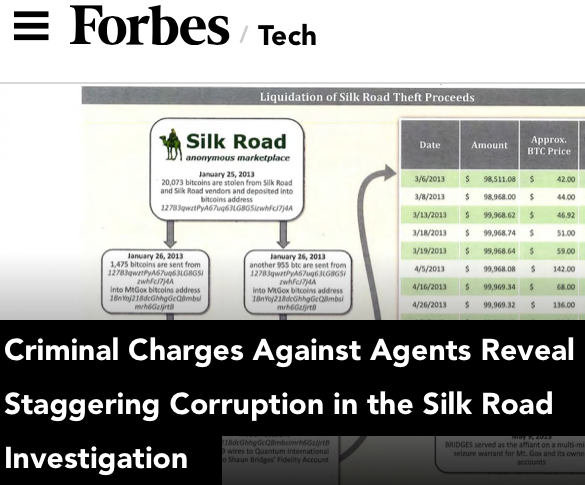The Corruption in the Silk Road Case
Two corrupt federal agents with unfettered access to the Silk Road website “sought deliberately to undermine the integrity of the ongoing…investigation,”[1] yet their existence was barred from being discussed at Ross Ulbricht’s trial. Ross’s jury never knew that all the evidence from the website had been tainted.
In April 2015, just seven weeks after Ross’s trial concluded, it was revealed that two federal agents at the core of the Silk Road investigation—DEA agent Carl Force and Secret Service agent Shaun Bridges—were charged with corruption directly related to their involvement in Silk Road.[2] It was later disclosed that Bridges was also working for the NSA during this time.[3] The two agents had been under investigation for nearly a year but Ross’s prosecutors fought to keep their existence under seal until after the jury had convicted Ross.[4]
Bridges’s specialty was in “computer forensics and anonymity software derived from Tor.” He was the “subject matter expert in Bitcoin” and he assisted Force “in his illegal, unauthorized infiltration and manipulation of the Silk Road website.”[5][6]

The agents went after the bitcoins on Silk Road and were admittedly involved in numerous dubious plots, including one where they tricked Curtis Green, a senior Silk Road admin, into accepting a controlled delivery of drugs. When Green gave them his address, the two agents arrested him.[7] During his interrogation, Green told them how to exploit Silk Road’s system, change passwords and take over accounts. Bridges then used Green’s account to hijack and empty the accounts of top Silk Road vendors.[8]

- usurp control of any account, including that of DPR, without DPR knowing or losing access, and act as DPR.[9]
- change anything in the Silk Road database, including forum posts and chat messages.[10]
In a 2018 public interview, Green revealed how his Silk Road chat logs had been manipulated, presumably by Bridges or Force.
“I went through all my old posts from me, and I didn’t write that…It looked totally foreign to me…It didn’t ring a bell…And it was all very detrimental, it made me look bad.” [11]
In the same interview, Green also discussed the anonymous murder-for-hire chat logs that were the basis for the unprosecuted, false—and now dismissed—allegations that the prosecution and the media used to smear Ross.
“When I saw the [murder-for-hire] transcripts,” Green said, they were “[in line with Force’s] narrative, exactly what he portrayed. So was it there or did they put it there?” [12]
August 8, 2018
Although a few of the agents’ aliases were revealed (DeathFromAbove, French Maid), it remains unclear how many accounts Force and Bridges created, took over, or impersonated. In fact, they even had the ability to take over DPR’s account and act as DPR without the administrator’s knowledge.
The full nature of Force and Bridges’s misconduct has yet to be disclosed, as the government quickly reached plea agreements with both agents, resolving their cases without any additional disclosure to the public.[13]

The agents—who pled guilty and were sent to prison—were never required to decrypt their encrypted Silk Road chat logs, nor were they required to turn over their laptops, email accounts, and other digital information that might reveal the depth of their involvement. Assistant U.S Attorney Kathryn Haun stated during Bridges’s sentencing that “there are a lot of unanswered questions.”[14]
In 2016, over a year after Ross’s trial ended, essential evidence was discovered by the defense proving that someone within the government, with high-level access to Silk Road, had tampered with the digital information used to convict Ross. Were Bridges and Force involved? Was it a third corrupt agent? Was it someone else entirely?
To this day, it is unknown to what extent Force and Bridges compromised the Silk Road website and the evidence used against Ross.
The prosecution of Force shed “light on his capacity for fraud, deception, forgery, abuse of his government authority and access–including predatory and retaliatory conduct and false accusations against innocent–and inventing complex, layered cover stories to conceal his misdeeds.”
– Joshua Dratel, Criminal Defense Attorney. [15]
In October 2020, Carl Mark Force was released from prison after having served 5.5 years. Just a year later, in October 2021, Shaun Bridges was released after having served 6 years. Meanwhile, Ross is in his 12th year of serving a double life plus 40 year-sentence without parole.
References
- ▲[1] – Force/Bridges criminal complaint (page 14)
- ▲[2] – Forbes article, March 31, 2015 (“Criminal Charges Against Agents Reveal Staggering Corruption in the Silk Road Investigation”)
- ▲[3] – Shaun Bridges sentencing transcript (page 19)
- ▲[4] – Appeal brief (page 18)
- ▲[5] – Force/Bridges criminal complaint (pages 40)
- ▲[6] – Ross’s appeal brief (pages 34-35)
- ▲[7] – Reply Memorandum of Law in support of Ross’s post-trial motions (page 55)
- ▲[8] – Force/Bridges criminal complaint (page 5)
- ▲[9] – Reply Memorandum of Law in support of Ross’s post-trial motions (page 3)
- ▲[10] – Reply Memorandum of Law in support of Ross’s post-trial motions (page 36)
- ▲[11] – Curtis Green Interview, The Crypto Show, Youtube, August 9, 2018 (“Never Before Heard Information About The Silk Road by Silk Road Admin Curtis Green and Promether”), Timestamp: 55m 28s
- ▲[12] – Curtis Green Interview, The Crypto Show, Youtube, August 9, 2018 (“Never Before Heard Information About The Silk Road by Silk Road Admin Curtis Green and Promether”), Timestamp 52m 41s
- ▲[13] – Ross’s appeal brief(page 23)
- ▲[14] – Shaun Bridges’s sentencing transcript(page 16)
- ▲[15] – Ross’s appeal brief (page 35)
- ▲[16] – NakedSecurity article, October 21, 2015 (“Corrupt ex-DEA agent Carl Force gets 6 years for extorting Silk Road”)
- ▲[17] – ArsTechnica article, December 7, 2015 (“Judge sets 71-month sentence for former Secret Service agent who plundered Silk Road”)
- ▲[18] – Reuters article, November 7, 2017 (“Ex-agent in Silk Road probe gets more prison time for bitcoin theft”)


